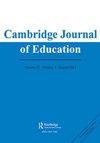And then there were three: (re-)distributing educational responsibilities in response to the growing use of shadow education in the Netherlands
IF 1.5
3区 教育学
Q2 EDUCATION & EDUCATIONAL RESEARCH
引用次数: 2
Abstract
ABSTRACT Over the past two decades, as in many countries, the use of private tutoring (‘shadow education’) has increased substantially in the Netherlands. Educators and policy makers are raising questions regarding the role that shadow education may play in relation to the traditional configuration of the home and school being assigned the responsibility for children’s education. In five mixed focus groups (n = 43), the authors explored what key players – teachers, parents and tutors – consider to be their own and each other’s pedagogical and educational responsibilities. Results show that two related tensions arise during role allocation: first, the normative question of whether a tripartite configuration which includes tutoring should be accepted or defied; and, second, concerns about tutoring not being equally accessible to students from all social classes. The study indicates that stakeholders’ explication of mutual perspectives on individual and shared roles may yield new schemes of cooperation that are based on collaborative responsibility, rather than competition about individual responsibilities, for student learning.然后有三个:(重新)分配教育责任,以应对荷兰越来越多地使用影子教育
在过去的二十年里,与许多国家一样,私人辅导(“影子教育”)的使用在荷兰大幅增加。教育工作者和政策制定者对影子教育在家庭和学校承担儿童教育责任的传统格局中可能发挥的作用提出了质疑。在五个混合焦点小组(n = 43)中,作者探讨了教师、家长和导师等关键角色认为自己和彼此的教学和教育责任是什么。结果表明,在角色配置过程中出现了两个相关的紧张关系:第一,包括辅导在内的三方配置是接受还是反对的规范性问题;其次,人们担心并非所有社会阶层的学生都能平等地获得辅导。研究表明,利益相关者对个人和共同角色的相互观点的解释可能会产生新的合作方案,这种合作方案基于合作责任,而不是基于个人责任的竞争,以促进学生的学习。
本文章由计算机程序翻译,如有差异,请以英文原文为准。
求助全文
约1分钟内获得全文
求助全文
来源期刊

Cambridge Journal of Education
EDUCATION & EDUCATIONAL RESEARCH-
CiteScore
5.30
自引率
4.30%
发文量
35
期刊介绍:
Cambridge Journal of Education publishes original refereed articles on all aspects of education, with a particular emphasis on work that contributes to a shared understanding amongst academic researchers, theorists, practising teachers, policy-makers and educational administrators. The journal also welcomes the submission of systematic review articles that summarise and offer new insights into specific areas of educational concern. With a wide international readership, Cambridge Journal of Education publishes contributions drawn from different educational systems and cultures enabling continued in-depth discussion of global educational theory, policy and practice. The journal’s Special Issue programme encourages and stimulates focused discussion and engagement with significant themes and responses to topics raised by readers and contributors. Cambridge Journal of Education welcomes proposals for future editions.
 求助内容:
求助内容: 应助结果提醒方式:
应助结果提醒方式:


